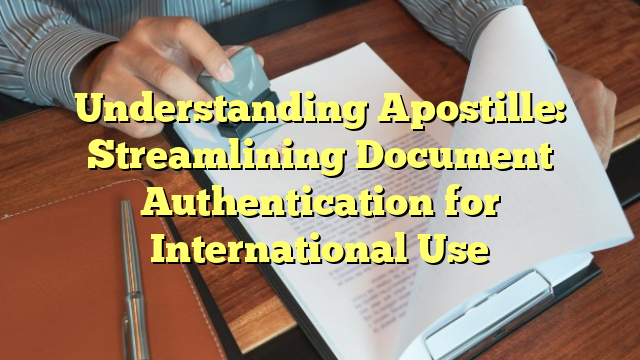In an increasingly interconnected world, the need for efficient and reliable document authentication has become essential. The term “apostille” plays a crucial role in simplifying the process of legalizing documents for international use.
In this article, we will explore the meaning of apostille, its purpose, and the significant impact it has made in streamlining document authentication procedures worldwide.
By understanding apostille and its implications, individuals and organizations can navigate the complexities of cross-border transactions with ease and confidence. Notary Mobile App
Section 1: Defining Apostille
An apostille is an official certification issued by a competent authority to authenticate the origin and validity of a public document. It is a simplified form of document legalization recognized by countries that are signatories to the Hague Convention Abolishing the Requirement for Legalization for Foreign Public Documents, commonly known as the Apostille Convention. The purpose of apostille is to facilitate the acceptance of public documents across borders without the need for further authentication.
Section 2: The Hague Apostille Convention
2.1 Background and Objectives:
The Hague Apostille Convention was established in 1961 with the aim of simplifying the process of authenticating foreign public documents. The convention introduced the concept of apostille, a standardized form of authentication that ensures the legal validity of documents issued in one signatory country and intended for use in another.
2.2 Participating Countries:
As of the knowledge cutoff date of September 2021, there are over 120 member countries and territories that have acceded to the Apostille Convention. These countries include major international players such as the United States, the United Kingdom, Australia, Canada, Germany, France, and many others. The list of participating countries continues to expand, making apostille an increasingly recognized and accepted form of document authentication globally.
Section 3: Purpose and Benefits of Apostille
3.1 Simplifying Cross-Border Transactions:
One of the primary purposes of apostille is to simplify the process of using foreign public documents in another member country. By providing a universally accepted certification, apostille eliminates the need for time-consuming and costly traditional legalization methods, such as consular legalization or diplomatic authentication. This simplification streamlines cross-border transactions, including international business agreements, educational exchanges, immigration processes, and more.
3.2 Ensuring Document Authenticity:
Apostille plays a crucial role in ensuring the authenticity and validity of public documents. The certification verifies the authority of the issuing entity, the authenticity of the document’s seal or stamp, and the identity and capacity of the signatory. This authentication process provides greater confidence and reliability when presenting public documents in foreign jurisdictions, protecting against fraud and ensuring the integrity of legal transactions.
3.3 Expediting Document Processing:
With the implementation of apostille, the process of document authentication becomes significantly faster and more efficient. Instead of navigating through multiple layers of legalization, the apostille certification is issued by a competent authority in the country where the document originated. This expedites the overall process, saving time and resources for individuals, businesses, and government entities.
3.4 Enhancing Legal Certainty:
Apostille enhances legal certainty by creating a standardized and internationally recognized authentication process. The certification ensures that the document meets the requirements of the issuing country and complies with the principles outlined in the Apostille Convention. This uniformity and transparency increase predictability and reduce legal ambiguity when utilizing foreign public documents.
Section 4: Obtaining an Apostille
4.1 Eligible Documents:
Apostille is generally applicable to public documents issued by government authorities, such as birth certificates, marriage certificates, educational diplomas, power of attorney documents, notarized documents, and court-issued documents. However, the specific types of documents eligible for apostille may vary depending on the laws and regulations of each member country.
4.2 Competent Authorities:
Each member country designates competent authorities responsible for issuing apostille certifications. These authorities may include government departments, ministries, courts, or designated agencies. The competent authority verifies the authenticity of the document, applies the apostille certification, and attaches it to the original or a certified copy of the document.
4.3 Validity and Recognition:
Once an apostille certification is affixed to a public document, it is considered valid and legally recognized by all member countries of the Apostille Convention. The receiving country accepts the apostille as proof of the document’s authenticity and exempts it from any further legalization requirements.
Section 5: Limitations of Apostille
While apostille simplifies document authentication for international use, it is important to note its limitations:
5.1 Non-Member Countries:
Apostille is only applicable in member countries of the Hague Apostille Convention. If a document is intended for use in a non-member country, traditional legalization methods may still be required.
5.2 Non-Public Documents:
Apostille is specific to public documents issued by government authorities. Private documents, such as contracts or commercial agreements, typically require alternative forms of legalization, such as notarization or consular certification.
5.3 Language Limitations:
Apostille certifications are usually issued in the official language of the issuing country. In some cases, a translation of the apostille may be required for the document to be accepted in the receiving country.
Section 6: The Future of Apostille
The apostille system has greatly simplified document authentication processes globally. However, there are ongoing discussions and efforts to further streamline and modernize these procedures. This includes exploring the use of electronic apostilles, implementing digital authentication mechanisms, and improving international cooperation and information exchange.
Conclusion:
Apostille has revolutionized document authentication by providing a simplified and universally recognized certification process. It has significantly reduced the administrative burden and costs associated with cross-border transactions, benefiting individuals, businesses, and governments worldwide.
As the global economy continues to grow and international interactions become more frequent, apostille will play an increasingly important role in facilitating seamless document authentication and ensuring the legal validity of public documents across borders.
By understanding the meaning and implications of apostille, individuals and organizations can navigate the complexities of international transactions with confidence and efficiency.
